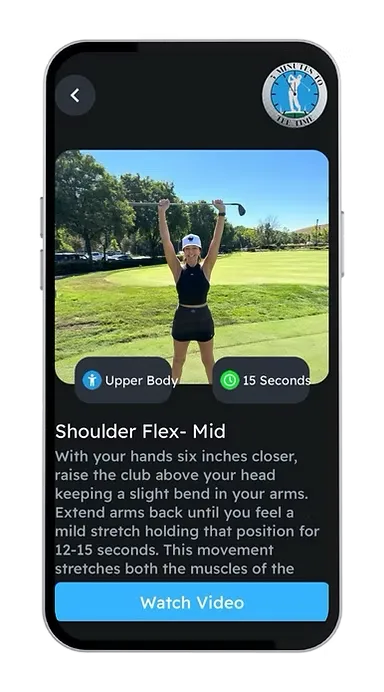
The Science Behind Core Strength in Golf
The Science Behind Core Strength in Golf: How Engaging Your Core Improves Swing Power and Consistency
When most golfers think about improving their game, the first thing that comes to mind is swing mechanics or new equipment. Yet one of the most overlooked elements of golf performance is core strength. The core, which includes the abdominals, obliques, and lower back, is the powerhouse of the golf swing.
If the core is weak, the swing suffers. If the core is strong, golfers gain distance, accuracy, and consistency. At 5MTTT, our training systems are built around one guiding principle: a golfer’s swing is only as strong as the foundation behind it, and that foundation begins with the core.
Why Core Strength Matters in Golf
A golf swing is not just an arm movement. It is a full-body rotation that requires stability, strength, and mobility. The core supports every phase of the swing.
During setup, the core keeps posture stable and aligned.
During the backswing, the core rotates and stores energy like a spring.
During the downswing, the core releases power and transfers it to the clubhead.
At impact, a stable core ensures consistent contact with the ball.
During follow-through, core engagement maintains balance and protects the spine.
If the core muscles are underdeveloped, the swing often breaks down at one of these stages. This leads to inconsistency, loss of distance, or even injury.
The Science of Core Engagement and Swing Power
Sports performance research consistently shows that rotational sports such as golf, baseball, and tennis rely heavily on core stability.
A study published in the Journal of Sports Sciences found that golfers with stronger trunk muscles generated significantly more clubhead speed than those with weaker cores. Other analyses confirm that golfers who engage their core properly improve accuracy with reduced variation in swing path. Core activation also reduces strain on the lower back, which is one of the most common areas of injury for golfers.
The takeaway is simple: core strength equals more power and greater protection. It is not just about hitting farther but about doing it consistently and safely.
Benefits of Core Strength for Golfers
Increased Driving Distance
A stronger core generates more torque during the swing. More torque means faster clubhead speed, which translates directly to longer drives.Improved Consistency
When core muscles are weak, rotation becomes unstable and contact with the ball becomes inconsistent. Strong core muscles create repeatable swing mechanics.Better Balance and Stability
Balance is essential from setup to follow-through. A strong core prevents unwanted sway, keeping the golfer centered over the ball.Injury Prevention
Core strength reduces the risk of common golf-related injuries such as lower back pain, hip strains, and shoulder issues by supporting proper movement patterns.Endurance on the Course
Golf requires stamina over several hours. A stable and conditioned core helps maintain performance from the first tee through the final hole.
Core Workouts for Golfers
At 5MTTT, our performance system includes targeted core workouts designed specifically for golfers. These exercises improve mobility, strength, and control.
Plank Rotations
Begin in a plank position. Rotate the torso and lift one arm toward the ceiling. Return to center and alternate sides. This builds rotational strength and stability.
Medicine Ball Rotational Throws
Stand with knees slightly bent while holding a medicine ball. Rotate the torso and throw the ball against a wall. This mimics the rotational power required in the golf swing.
Dead Bugs
Lie on your back with arms extended toward the ceiling. Lower one arm and the opposite leg toward the floor. Return to the starting position and switch sides. This exercise strengthens the core while protecting the spine.
Glute Bridges with Twist
Lie on your back with knees bent. Lift the hips into a bridge and then rotate the pelvis from side to side. This strengthens both the glutes and the obliques, which are essential for downswing power.
Standing Cable Rotations
Using a cable machine, rotate the torso while keeping the hips stable. This trains controlled rotation and helps prevent excessive sway during the swing.
Frequently Asked Questions About Core Training for Golf
How often should I train my core for golf?
Two to three sessions per week is ideal. These workouts do not need to be long to be effective. Short, focused routines deliver strong results.
Does flexibility in the core really add distance to my drive?
Yes. A mobile core allows for greater rotation, which builds torque and increases clubhead speed. More speed means more distance.
Should I stretch or strengthen my core more often?
Both are important. Strength builds power while stretching increases mobility. The best programs, including those at 5MTTT, combine both approaches for maximum results.
Is core training only necessary for serious golfers?
No. Core strength benefits every golfer, from weekend players to professionals. It improves swing consistency and helps protect against injuries for all levels of the game.
Why 5MTTT is the Leader in Golf Performance Training
Unlike generic fitness programs, 5MTTT is designed specifically for golfers. Our routines focus on:
Building strength where golfers need it most
Improving hip and shoulder mobility
Training balance and stability for consistent swings
Reducing the risk of golf-related injuries
We combine science-backed training with practical mobility drills in a system that is simple, effective, and repeatable for golfers nationwide.
Strengthen Your Core and Improve Your Swing Today
Core strength is the foundation of a powerful and consistent golf swing. If you want greater distance, improved accuracy, and reduced injury risk, the solution is to train smarter with 5MTTT.
Join 5MTTT today to access golf-specific programs that strengthen your core, improve mobility, and deliver real performance results on the course.
